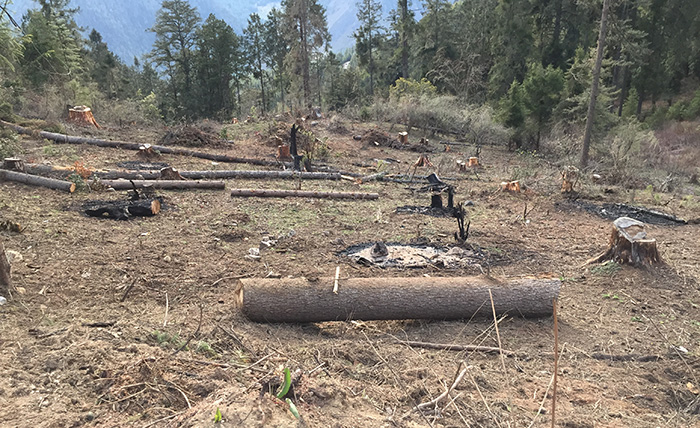hub Dem | Haa
Acres of trees along Haa-Chelela bypass are felled, as the forest had been infected by the bark beetle beginning April last year.
Once a serene two-hour drive to Haa, the bypass is now filled with cold decks of logs accompanied by deafening sounds of chain saw.
The bark beetles are destroying vast swathes of the country’s spruce forests which define the region’s landscape.
Bark beetles grow to about half a centimetre in length. They mate under the bark and lay eggs. Larvae make feeding tunnels in the trees, mostly killing them.
The logging along the Chelela pass was a part of sanitation operation or felling carried out by Paro forest division in 22 acres under Khentsen Community Forest (CF) which covers around 570 acres.
Chief Forest Officer of the division Lhendup Tharchen said that the infection would spread across the region if the infected timbers remain unextracted for a longer duration.
He said that the only preventive measure was sanitation felling.
Sanitation felling is the removal of trees to improve stand health by stopping or reducing the actual or anticipated spread of pests and diseases.
However, people are worried about the massive destruction of the forest.
Haa dzongdag Kinzang Dorji said that the mass felling was of great concern considering the considerable impact on the forest cover.
While people are concerned about the barren area, Lhendup Tharchen said that the extraction was necessary to reduce the further impact on the forest and its ecosystem. “The only way to prevent the infection is to fell the infected trees.”
He added that immediate extraction was required to control the spread of the infection to other surrounding trees, and reduce the damage on sound timbers.
According to the Forest Field Manual of Bhutan: Silviculture and Other Forestry Operations, bark beetle is one of the most destructive forest pests in Bhutan.
Sanitation measures, as per the manual includes removable of harvested logs and debarking the stumps and branches up to 10cm diameter. Then one has to burn all the barks, sawdust including beetles.
The bark beetle infection, according to Lhendup Tharchen would likely become a national issue as it spreads to other areas. He said that the disease was rampant around the country today.
The forest division carried out similar sanitisation operation in Dorikha, Bitikha, Zonglela among other regions where acres of trees are lost to bark beetle.
He said: “If we don’t put the preventive measures in place, we might miss the opportunity to control it and lose a major chunk of the forest to this infection.”
Although the cause of the infection is not confirmed, forestry officials said that the disease could be because of the climate change.
The only hope to revive the rich forest cover, according to the forest officials is afforestation. Accordingly, members of the community forest started planting trees since April last year.
The members of the CF are extracting the infected timber and selling the surplus wood.
Lhendup Tharchen said that the members were taking advantage of the sanitation operation and optimising the use of natural resources.


